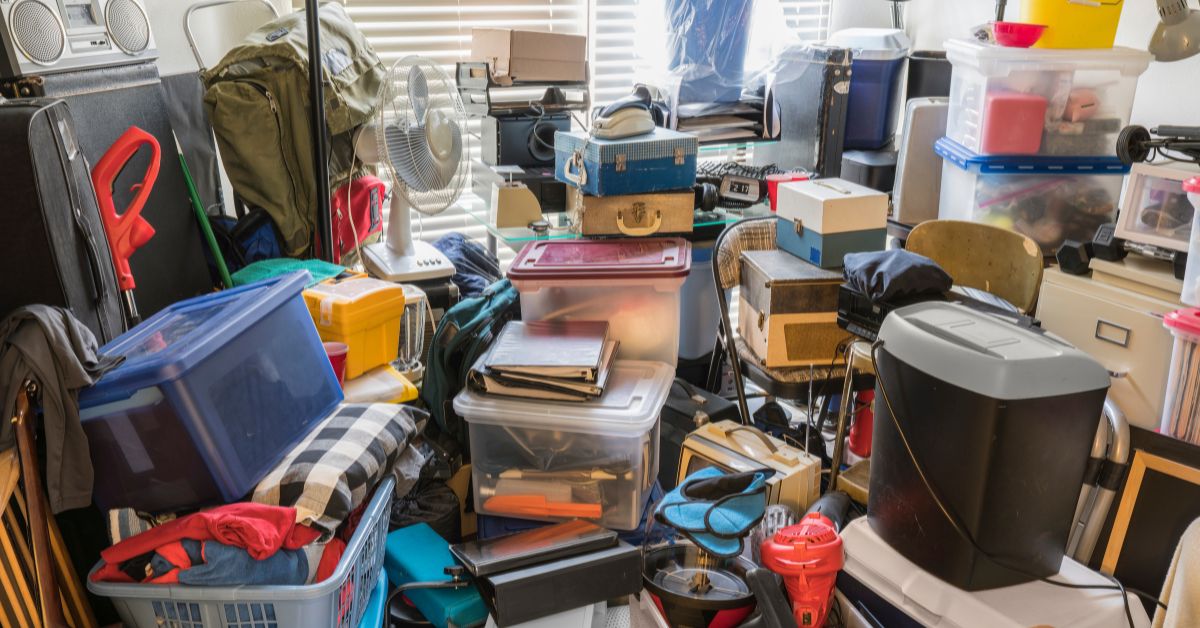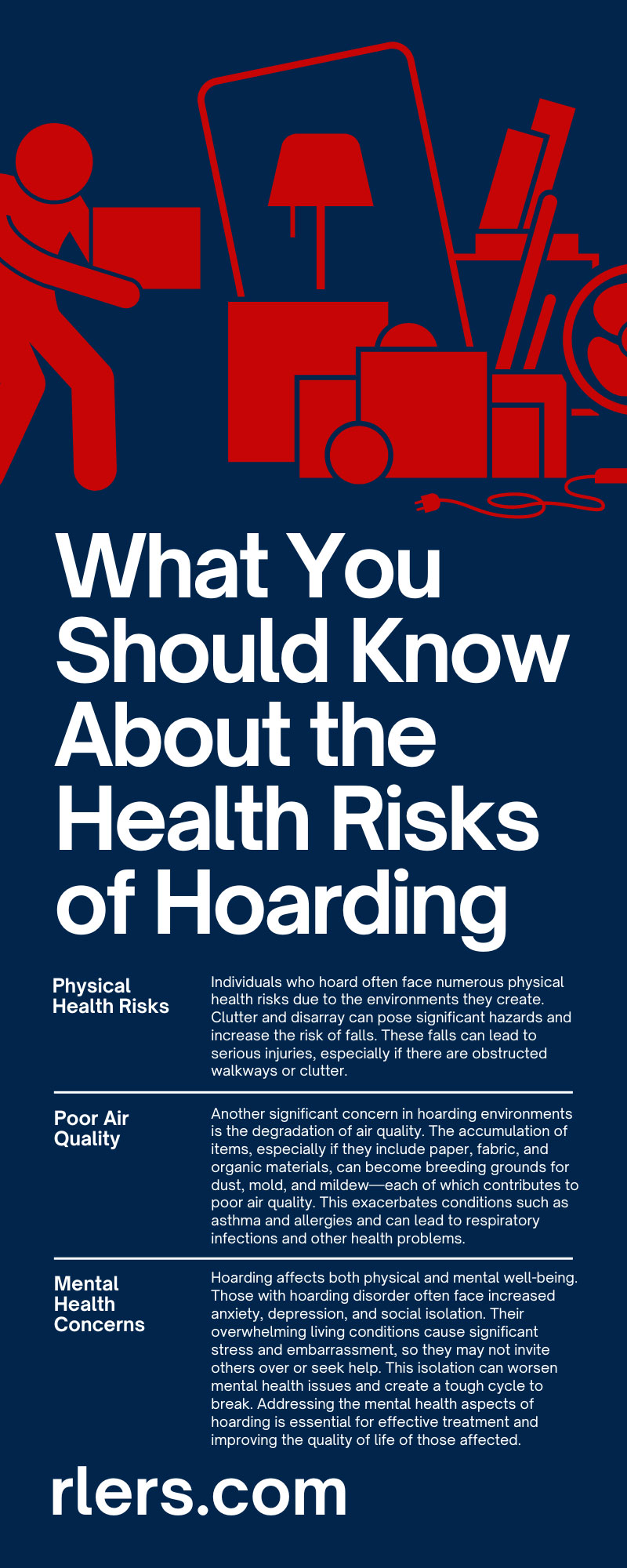
Living in a cluttered and disorganized environment may not seem like a major health concern, but for those who struggle with hoarding, it can have serious consequences. Hoarding isn’t simply a matter of being messy or holding onto too many items; it’s a complex disorder that affects 2–6 percent of the American population.
Whether you’re dealing with your own hoarding tendencies or you’re concerned about someone you love, knowing about the health risks is important for awareness. Understanding these risks allows you to approach this situation with compassion and support. Learn more about this often misunderstood disorder here.
Understanding Hoarding Disorder
Someone with a hoarding disorder will have a difficult time parting with or discarding possessions. This is a persistent issue for all items, regardless of their actual value. This condition leads to excessive accumulation of items that congest and clutter living spaces. This severely compromises their use and leads to significant distress or impairment in day-to-day activities.
Unlike people who collect items out of passion, those with hoarding disorder save random items and struggle to organize them, often resulting in a living space that’s unmanageable and unsafe. This disorder can affect anyone, regardless of age, gender, or economic status, reflecting a complex interplay of genetic, psychological, and environmental factors.
Health Risks Associated With Hoarding
Physical Health Risks
Individuals who hoard often face numerous physical health risks due to the environments they create. Clutter and disarray can pose significant hazards and increase the risk of falls. These falls can lead to serious injuries, especially if there are obstructed walkways or clutter.
Furthermore, extreme clutter can hinder access to bathrooms and complicate personal hygiene, which is critical for maintaining physical health. These factors collectively contribute to a deteriorating physical health status, underscoring the importance of addressing hoarding behavior.
Poor Air Quality
Another significant concern in hoarding environments is the degradation of air quality. The accumulation of items, especially if they include paper, fabric, and organic materials, can become breeding grounds for dust, mold, and mildew—each of which contributes to poor air quality. This exacerbates conditions such as asthma and allergies and can lead to respiratory infections and other health problems.
The dense clutter can restrict airflow, preventing proper ventilation and allowing harmful particles to become trapped inside living spaces. This compromised air quality can pose additional health risks to individuals.
Mental Health Concerns
Hoarding affects both physical and mental well-being. Those with hoarding disorder often face increased anxiety, depression, and social isolation. Their overwhelming living conditions cause significant stress and embarrassment, so they may not invite others over or seek help. This isolation can worsen mental health issues and create a tough cycle to break. Addressing the mental health aspects of hoarding is essential for effective treatment and improving the quality of life of those affected.
Nutritional Deficiencies
Nutritional deficiencies are another concerning health risk for individuals with hoarding disorders. The cluttered conditions often impede access to clean, functional kitchen spaces, making it challenging to store, prepare, and cook healthy meals. This situation may lead individuals to depend heavily on processed foods or takeout, which are generally lower in nutritional value. The lack of fresh food and the inability to prepare meals can contribute to various nutritional deficiencies, affecting overall health and well-being.
Sleep Disruptions
Hoarding can severely disrupt sleep patterns, leading to various sleep issues. The cluttered environment often leaves little space for a comfortable sleeping area. Sometimes, bedrooms may be entirely unusable due to accumulated possessions. This forces individuals to sleep in cramped conditions or alternative spaces not conducive to restful sleep. The combination of a blocked sleeping environment and mental stress can severely impact sleep quality and quantity.
Fire Hazards
One of the most severe risks of hoarding is the increased likelihood of fire hazards. The excessive accumulation of items, especially flammable materials like papers, clothes, and garbage, significantly heightens the risk of a fire starting and spreading rapidly. Cluttered environments make it difficult to exit quickly in an emergency, endangering lives and hindering rescue efforts. The threat of fire in hoarding situations is significant, emphasizing the need for intervention and support to address hoarding behaviors.
Structural Damage to the Home
The accumulation of excessive items can lead to structural damage in the home. The weight of stacked belongings, especially heavy items, can strain floors and walls, risking collapse or significant damage. This jeopardizes the safety of the inhabitants and can create additional health problems. Addressing hoarding is crucial for both the well-being of the individual and the safety of their living environment.
Pests and Infestations
Hoarding conditions significantly increase the risk of pest infestations like rodents, cockroaches, and other vermin. The accumulation of items, especially food and organic materials, can attract pests and lead to their proliferation.
These infestations compromise the cleanliness and safety of the living environment and pose serious health risks. Pests are carriers of various diseases, and their presence can worsen allergies and asthma, contaminate food, and create an unsanitary living space.
Redline Emergency Solutions
If you’re tackling the major task of cleaning a hoarding site, Redline Emergency Solutions is here to help. We specialize in biohazard cleaning services designed to safely and effectively remove any hazards in environments affected by severe hoarding. This includes mold, bacteria, and other potentially infectious materials. Our knowledgeable staff has the expertise and compassion to restore your or your loved one’s home back to a livable condition.
Understanding what you should know about the health risks of hoarding is crucial for anyone who is facing their own hoarding tendencies or is concerned about someone else. This disorder can have a profound impact on an individual’s health, safety, and quality of life. However, with the right support and interventions, such as those offered by Redline Emergency Solutions, positive change is possible.
Remember that recognizing the problem is the first step, and seeking help is a sign of strength. Together, we can address the complexities of hoarding disorder and support individuals in the process of reclaiming their spaces and their well-being.


